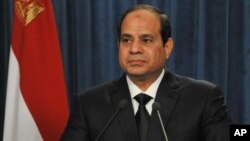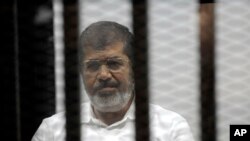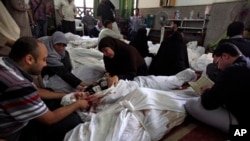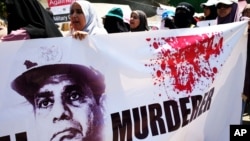President Barack Obama has lifted an 18-month weapons freeze on Egypt, prompting criticism from those concerned about rights abuses committed by the longtime Washington ally.
The move clears the way for the delivery of 12 F-16 aircraft, 20 Harpoon missiles, and up to 125 M1A1 Abrams tanks that had been held from the Egyptian military following a popularly backed coup.
Obama assured Egyptian President Abdel Fattah el-Sissi he also supports the full $1.3 billion in annual U.S. military assistance to Egypt, according to a White House statement issued Tuesday.
The aid was suspended in October 2013 in response to the Egyptian military's overthrow of the country's first freely-elected civilian President Mohamed Morsi and the subsequent brutal crackdown on his Islamist allies. Morsi has been in jail since the military ousted him in 2013.
Egyptian leaders said the weapons freeze was hampering the country's fight against Islamic militants in the Sinai Peninsula and neighboring Libya, as well as its efforts in the Saudi Arabia-led effort to combat Iran-backed Shi'ite rebels in Yemen.
The decision to lift the freeze was the result of a months-long review that required the White House to demonstrate restoring the aid was either a U.S. defense necessity or Cairo had made meaningful democratic reforms.
In their statements Tuesday, White House officials stressed U.S. national security interests, and not democratic reforms, as the justification for restoring the aid, even while insisting officials will continue to raise rights concerns with Egypt.
Sissi's 'appalling' human rights record
But simply condemning the "appalling" human rights record of Sissi's government is not enough, according to John Chalcraft, Associate Professor in the History and Politics of Empire and Imperialism at the London School of Economics.
"Obama’s signaling military support for such a regime is business as usual in regard to the U.S. posture in the region, but it is wrong on principle and stores up trouble for the future," he added.
"(Egypt) has set about crushing all forms of dissent, including that of liberals and human rights campaigners, who are in a state of desperation," Chalcraft told VOA. "The regime is cynically manipulating the narrowest of security and counter-terror discourses."
Tens of thousands have been arrested and hundreds killed in the crackdown on Morsi's Muslim Brotherhood, which was declared as a terrorist organization. Non-Islamist rights activists and journalists have also been increasingly targeted.
Timothy Kaldas, Non-Resident Fellow at the Tahrir Institute for Middle East Policy and Professor of Politics at Nile University, sees the White House decision as a continuation of longstanding U.S. policy in the region.
"It's not really that surprising. I mean, historically the United States has provided support, both financial and military, to Egypt, despite human rights violations and a pretty dubious commitment to democracy," he told VOA via phone.
"For the last several decades, the U.S., despite its language to the contrary, has never really placed a priority on these issues in comparison to its national security interests and having strong relationships with leaders in the region," he said.
The White House did implement some key limitations to the defense relationship that will "put our assistance programs more in line with current core U.S. policies," according to a statement.
Starting in 2018, new restrictions will limit the type of military equipment Egypt can purchase as part of the annual aid package. Egypt also will no longer be able to make weapons purchases on credit - a move that makes it easier to suspend or cancel military aid to Egypt in the future.
Although the new restrictions are significant, analysts say Sissi's government is likely to interpret the move as a victory, and not alter his crackdown on political opponents.







